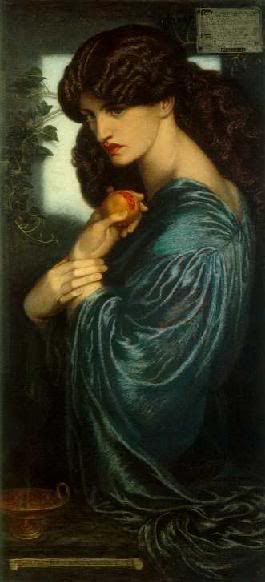Post by bluefedish on Jun 4, 2007 20:10:03 GMT -5
In Greek mythology, Persephone was the Queen of the Underworld, the Kore or young maiden, and the daughter of Demeter— and Zeus, in the Olympian version.
Persephone is her name in the Ionic Greek of epic literature. In other dialects she was known under various other names: Persephassa, Persephatta, or simply Kore.
In Greek art, Persephone/Kore is invariably portrayed robed. She may be carrying a sheaf of grain and smiling demurely with the "Archaic smile" of the Kore of Antenor.
The figure of Persephone is well-known today. Her story has great emotional power: an innocent maiden, a mother's grief at the abduction, and the return of her daughter. It is also cited frequently as a paradigm of myths that explain natural processes, with the descent and return of the goddess bringing about the change of seasons.
Of the four gods of Empedocles' elements it is the name of Persephone alone that is taboo, for the Greeks knew another face of Persephone as well. She was also the terrible Queen of the dead, whose name was not safe to speak aloud, who was named simply "The Maiden". In The Odyssey, when Odysseus goes to the Underworld, he refers to her as the Iron Queen. Her central myth, for all of its emotional familiarity, was also the tacit context of the secret initiatory mystery rites of regeneration at Eleusis, which promised immortality to their awe-struck participants — an immortality in her world beneath the soil, feasting with the heroes beneath her dread gaze (Kerenyi 1960, 1967).

Selected Source:
en.wikipedia.org/wiki/Persephone
Persephone is her name in the Ionic Greek of epic literature. In other dialects she was known under various other names: Persephassa, Persephatta, or simply Kore.
In Greek art, Persephone/Kore is invariably portrayed robed. She may be carrying a sheaf of grain and smiling demurely with the "Archaic smile" of the Kore of Antenor.
The figure of Persephone is well-known today. Her story has great emotional power: an innocent maiden, a mother's grief at the abduction, and the return of her daughter. It is also cited frequently as a paradigm of myths that explain natural processes, with the descent and return of the goddess bringing about the change of seasons.
Of the four gods of Empedocles' elements it is the name of Persephone alone that is taboo, for the Greeks knew another face of Persephone as well. She was also the terrible Queen of the dead, whose name was not safe to speak aloud, who was named simply "The Maiden". In The Odyssey, when Odysseus goes to the Underworld, he refers to her as the Iron Queen. Her central myth, for all of its emotional familiarity, was also the tacit context of the secret initiatory mystery rites of regeneration at Eleusis, which promised immortality to their awe-struck participants — an immortality in her world beneath the soil, feasting with the heroes beneath her dread gaze (Kerenyi 1960, 1967).

Selected Source:
en.wikipedia.org/wiki/Persephone



